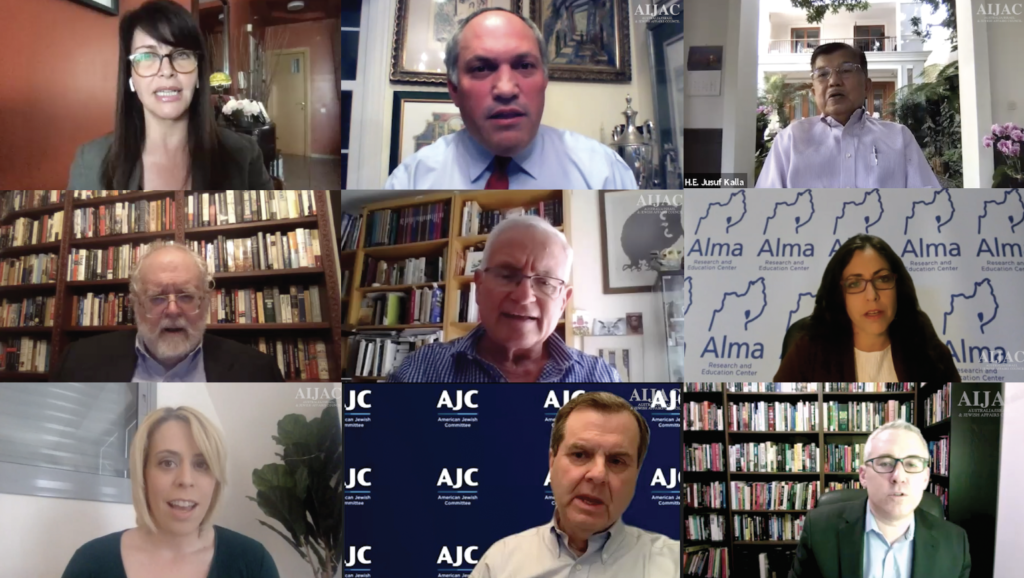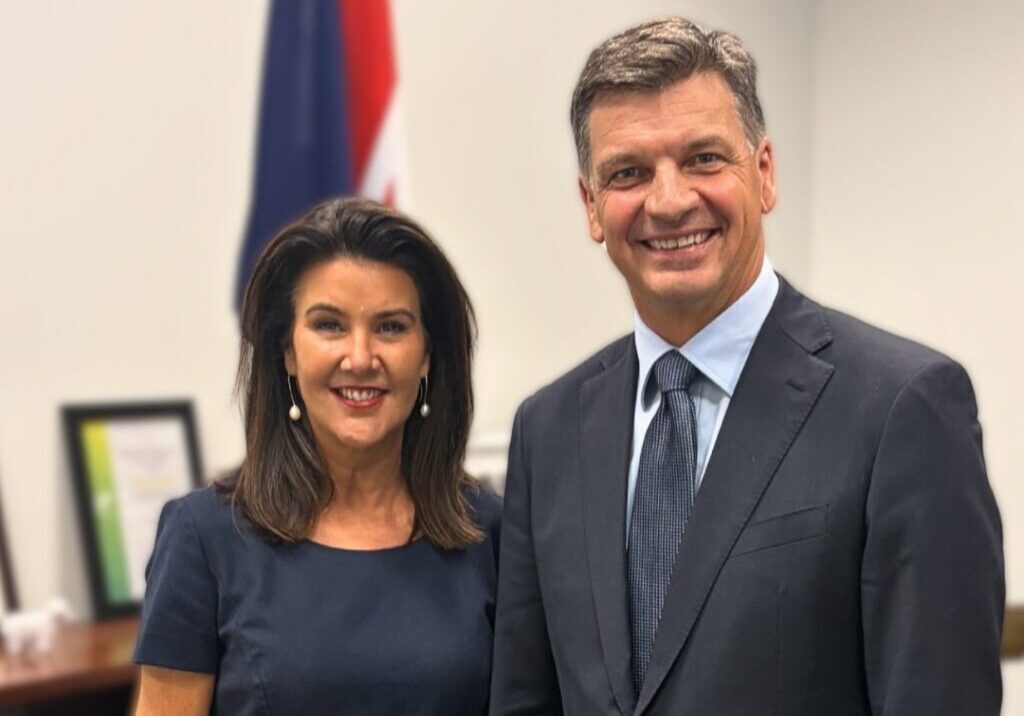Australia/Israel Review
AIJAC in Webinar Land
Jul 6, 2020 | Jamie Hyams

With crisis often comes innovation and opportunity. Thus, the coronavirus pandemic has seen a flourishing of webinars from Jewish communal organisations, with AIJAC in the vanguard. If we can’t bring guests to Australia in person, we can certainly bring them to viewers’ screens for an hour of fascinating analysis.
Starting with the doyen of Israeli political commentators, Ehud Yaari, in late March, AIJAC had conducted 11 webinars by the third week of June. The broad range of speakers have provided not just valuable insights, but at times important messages for all concerned with the state of the world. Below are some highlights from each.
Ehud Yaari
Yaari explained that Benny Gantz’s decision to join Binyamin Netanyahu in a national unity government was the least bad option open to him once his own hopes of forming a government failed. Yaari expected Gantz to moderate the government’s stance towards the Palestinian Authority (PA), but pointed out that no-one in the Israeli mainstream, including Gantz, expects negotiations to resume anytime soon.
He also noted that the need for both sides to work together to fight the coronavirus had seen some of the closest security cooperation ever between Israel and the PA, and even between Israel and Hamas.
Dr. Jonathan Schanzer
A former terrorism finance analyst at the US Treasury, Dr. Schanzer warned that 2020 would be the year of Iran’s extremely accurate precision-guided missile (PGM). He explained that the Iranian regime is using the US$150 billion freed up by the JCPOA nuclear agreement to fund its terror proxies including Hamas and Hezbollah to project its power across the Middle East.
However, he pointed out, there have been an estimated 1,000 attacks targeting Iranian PGMs and associated facilities in Syria and Iraq since the end of 2018, seemingly by Israel, as Iran tries to supply these weapons to Hezbollah. He added that the whole of Hezbollah and Iran’s other terrorist proxies should be proscribed as terror groups.
Dr. Einat Wilf
Former Israeli Labor Knesset member and adviser to Shimon Peres, Dr. Einat Wilf described the Second Intifada, following Yasser Arafat’s refusal of the 2000 Camp David peace offer, and Mahmoud Abbas rejecting an even more generous offer in 2008, as a massive wake-up call for many on the left, including herself.
This demonstrated to Dr. Wilf that the Palestinians want not a state, but to abolish Israel. She says at the heart of this is the claimed Palestinian “right of return” for the millions of descendants of refugees, and that UNRWA, the UN agency that caters for them, perpetuates the problem. She therefore calls for UNRWA’s abolition and for the Palestinian refugees to be treated the same as all other refugee populations.
Professor Walter Russell Mead
Distinguished academic and Wall Street Journal “Global View” columnist Professor Mead said that US President Donald Trump’s strategy on Iran – to use sanctions to pressure Teheran to renegotiate the JCPOA on the nuclear issue and rein in its regional misbehaviour – is working, but there is as of yet no end in sight.
He advised that, in considering extending sovereignty in the West Bank, Israel should calculate what it hopes to achieve against the cost in international relations, especially given its warming relations with various Arab countries.
Asked about the spike in antisemitism, he responded that to counter it, the Jewish people need a strong national state that can defend itself and act as an advocate for all Jews. A major difference between now and previous outbreaks of antisemitism is that Jews now have Israel to go to if needed, he said.
Brig. Gen. (res.) Yossi Kuperwasser
Brigadier General (res.) Kuperwasser, a former senior IDF intelligence officer, and Director-General of Israel’s Ministry of Strategic Affairs, also addressed antisemitism, saying that criticism of Israel is antisemitism when it amounts to delegitimising Israel, in effect denying Jews the right to self-determination; demonising Israel, calling it a Nazi state, apartheid, colonialist or racist; and double-standards, expecting of Israel different behaviour from that expected of other states.
Kuperwasser, who calls this embedded hatred of Israel and Jews “Israelophobia”, warns it has implications for Israeli security as it finds support in the left of Western society. He called for Australia to join other parliaments such as Austria’s and Germany’s in declaring the BDS movement antisemitic.
Michael Rubin
Middle East scholar and former Pentagon official Michael Rubin advised that the coronavirus will not change Iran’s or Turkey’s ambitions for Middle East hegemony, because it is the nature of ideological dictatorships to prioritise their ambitions above all else, including what is best for their own citizens.
He said that quiet diplomacy won’t work to free Kylie Moore-Gilbert, the Australian-British academic imprisoned in Iran, because that’s what Iran wants. Instead, the Australian Government should make the issue front and centre in all its interactions with Iran, and press its allies to do the same, because Iran will only listen when the cost of keeping her hostage becomes too high. He added that Australia has more moral authority and weight in Washington than it realises.
Lt. Col. (Res.) Sarit Zehavi
Former Israeli military intelligence officer Lt. Col. (res.) Zehavi, an expert on the threat to Israel from its north, said Australia needs to follow Germany’s lead and ban all branches of Hezbollah. Otherwise, she added, we are just enabling its military wing. By storing its arms in civilian areas in southern Lebanon and Beirut, Hezbollah uses “Lebanese civilians as human shields” as a matter of strategic policy, Zehavi said. She warned that, while Israel’s attacks on Iran and its proxies in Lebanon and Syria were based on careful calculations, the potential for escalation is ever-present if a raid inflicts more damage than intended.
His Excellency Jusuf Kalla
Former Indonesian Vice President Jusuf Kalla was bluntly dismissive of suggestions that Australia’s recognition of Jerusalem as Israel’s capital had damaged its relations with Indonesia, saying that Australia’s politics is an internal issue for Australia, not Indonesia. He explained that, while there are no official ties between Indonesia and Israel, 100,000 Indonesians visit Jerusalem each year, Indonesia still finds ways to import Israeli technology, and the country stands ready to support peace initiatives between Israel and the Palestinians. Kalla, who has met Binyamin Netanyahu and has visited Israel three times, added that Indonesians on the whole have no problems with Jews, and the country would easily establish diplomatic relations with Israel once peace with the Palestinians was achieved.
Dr. Eran Lerman
Dr. Eran Lerman, an Israeli expert on foreign relations and the Middle East, addressed the nuclear deal with Iran (JCPOA). He said Australia “should lend moral and diplomatic support for the efforts to force the Iranians to the table to renegotiate what was I think a catastrophic deal back in 2015, and if there’s one specific issue that must be renegotiated, it is what they call the sunset clauses. The time and moment at which the Iranians would be free from their obligations and would run their centrifuges at will.” He also called attention to Turkey’s intensifying efforts to dominate the eastern Mediterranean.
David Harris
David Harris, the long-serving CEO of the American Jewish Committee, explained that the three main sources of antisemitism are the far right, the far left and Islamists or jihadists, adding, “All three were threatening, all three were existentially important…And those on the right who only wanted to point the finger at the left and those on the left who only wanted to point the finger at the right were doing a disservice to the cause.”
He was also adamant that Palestinian rejectionism is the real challenge in discussing the Israeli-Palestinian situation.
Emily Schrader
Digital marketing expert Emily Schrader gave valuable insights into the way antisemitic groups use social media, and how to counter them. She noted the tendency of antisemites to attack “Zionists” using traditional antisemitic tropes, rather than directly attacking Jews, to escape censorship. Antisemites have also latched on to the coronavirus pandemic and the Black Lives Matter issue to attack Jews and Israel, she said. She noted that social media platforms seem to react less strongly to attacks on Jews than against other types of bigotry, but urged people to get involved in fighting back, saying, “It’s important to say the truth when you know the truth and to fight back when you see lies.”
For those interested in knowing what else our speakers said, reports of the webinars, video excerpts and recordings of the entire presentations are on the AIJAC website and Facebook page, and can be viewed on AIJAC’s YouTube channel. The webinar program will be continuing, so look out for coming events.
Tags: AIJAC, Asia, Australia, Israel, Middle East






